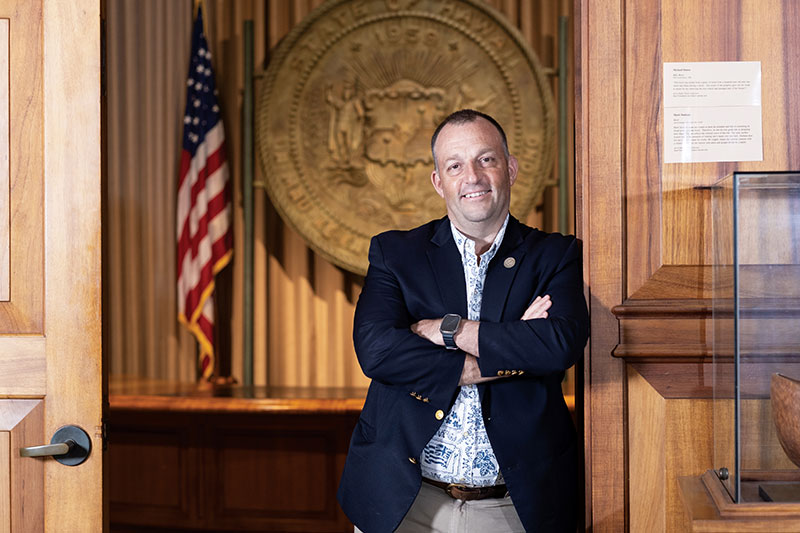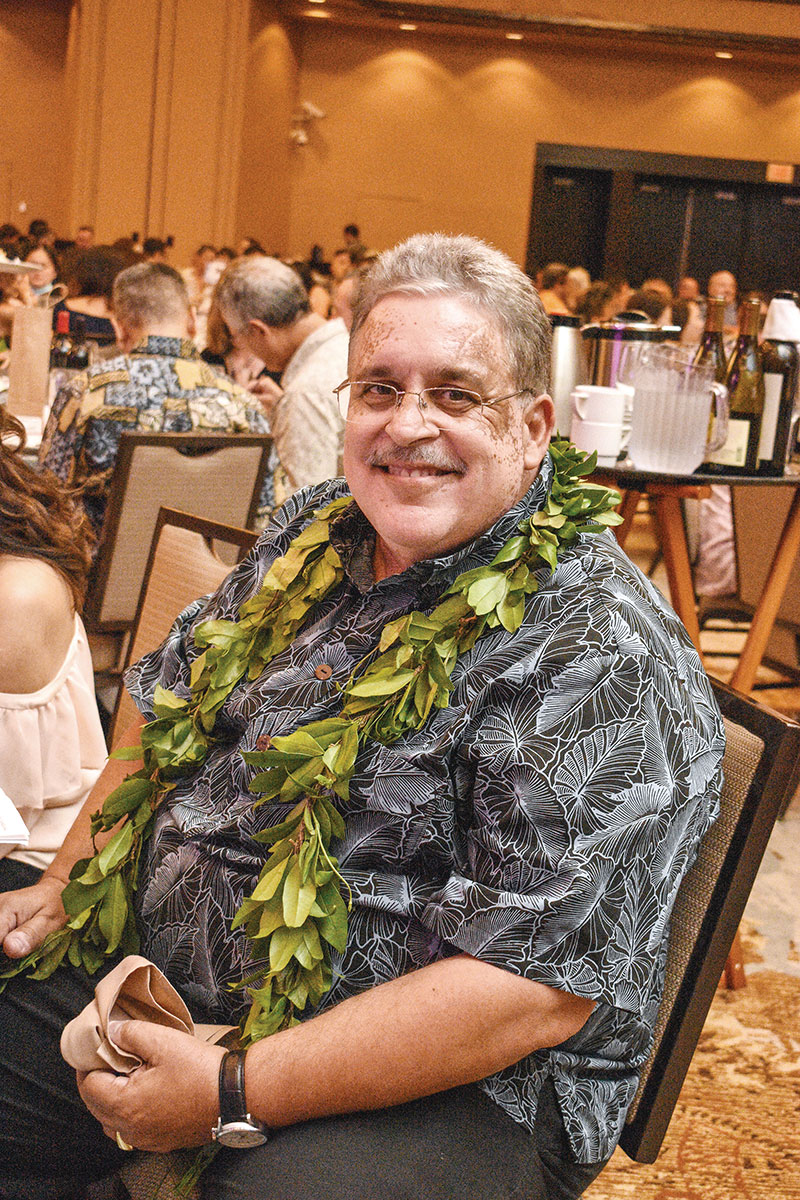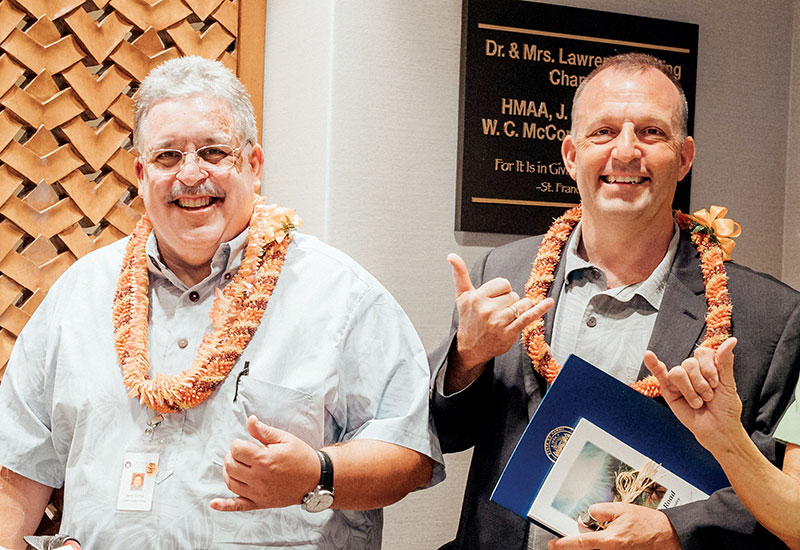A Special Tribute

Gov. Josh Green and Jerry Correa, former president and CEO of St. Francis Healthcare System of Hawai‘i, are the honorees at this year’s St. Francis Wine Gala Bene~ t.
It’s been said that tough times don’t create heroes, but they reveal our true heroes. With this thought in mind, St. Francis Healthcare System of Hawai‘i will recognize two such heroes for their work in the community.

Jerry Correa. PHOTO COURTESY ST. FRANCIS HEALTHCARE SYSTEM OF HAWAI‘I
The honorees are Gov. Josh Green, who, according to the organization, is being recognized “for his tireless commitment to our health and well-being,” and the late Jerry Correa, the former president and CEO of St. Francis Healthcare System of Hawai‘i, who “inspired others to lay hold of the Sisters of St. Francis’ adventurous spirit.”
Both men will be honored (Correa posthumously) at the St. Francis Wine Gala Benefit July 15 at Sheraton Waikīkī.

Being of service to others describes the character of Jerry Correa, left, and Gov. Josh Green. PHOTO COURTESY ST. FRANCIS HEALTHCARE SYSTEM OF HAWAI‘I
“(This recognition) means the world to me, especially because it is partially connected to someone who I revere, and that’s Jerry,” says Green of Correa, who passed away last October. “It’s very humbling and very touching to be connected to a person that’s helped guide such an amazing organization, so that means so much to me.
“And it’s very kind of them to recognize the work that I do, but I do it with the entire state’s health care team and all the people that are part of our homeless team,” continues Green. “So really, it’s just a kind thing for them to make this gesture, but it really should be spread out to all the people that are trying to help.”
Prior to becoming Hawai‘i’s ninth governor, Green worked as both a legislator and a physician — serving in the state House of Representatives and the state Senate from 2004 to 2018 before being elected lieutenant governor, while also caring for local families as a family practice physician and emergency room doctor on the Big Island for two decades.
“I became interested in medicine when I was traveling in India and it was while I was in the middle of that enormous country that I saw people struggling and suffering like never before,” remembers Green, who was a sophomore in college at the time. “I saw individuals when they would
come onto the train with severe disabilities and severe developmental problems and it was kind of heartbreaking. When I got back from that experience, I just thought that if I ever wanted to give back, it would probably be through medicine. That’s when I decided to become a physician and that led to a number of other experiences that led me to Hawai‘i.”
Raised in Pittsburgh, Pennsylvania, Green earned his medical degree from Penn State Milton S. Hershey Medical Center at Pennsylvania State University. He worked in Swaziland on a six-month medical mission, and after completing his residency in family practice, joined the National Health Service and was placed in Kā‘ū on Hawai‘i island as a doctor.
“In the third year of my work in Kā‘ū, things were particularly tough,” recalls Green. “I saw a lot of individuals wrestling with addiction. That’s when methamphetamine was spiking, and we just didn’t have a lot of services for our people. Most of the individuals in Kā‘ū that I was caring for were either Filipino or Hawaiian, so they were really suffering bad health disparities, terrible inequity, and I thought that it would be a good idea to have someone in health care represent these positions. I asked if I could just be an adviser to some of the legislators on health disparities, and they asked me to run for office, so I did and that was how I ended up getting into politics.
“They asked me to run for the House of Representatives and I was very lucky to win that seat and subsequently I started to really learn about health policy from the inside. I had seen it from the outside as a doctor and then when I saw it from the inside, I knew there were some things we could do that would have a big impact quickly so that was the beginning of this career. I certainly did not expect to end up in the role of governor. It was really just meant to be a temporary experience as a state legislator, state representative, state senator, and then go back full-time into health, but I ended up carrying a double life for a long time.”
According to the Centers for Disease Control and Prevention, Hawai‘i is recognized as the healthiest state, and has the longest life expectancy at nearly 81 years. Still, Green believes that more can be done.
Just last month, he signed 13 bills at a ceremony at Hawai‘i Community Health Center’s Kealakehe Clinic to support various aspects of health care that will allow for improved access and services to the community. He also signed legislation to expand access to health care on Maui and to uplift career advancement opportunities for health care workers in the state. And in May, he celebrated the arrival of Hawai‘i’s first medical respite, Kauhale, just steps away from the state Capitol. The medical units help homeless individuals who need extra care upon discharge from hospitals.
“I used to see individuals in the hospital that were homeless over and over again and I knew that that was not sustainable,” says Green. “Now, we’re starting Kauhale, which are villages in each community for large numbers of people that are homeless.
“Before I would treat a single individual with Narcan, the medicine that’s for an overdose. Now, we just passed a bill to check any drugs with a fentanyl strip and make Narcan available in all facilities. … I saw one person in a family that had a child with autism that was struggling and as senator, we passed a bill to make sure every family that had a child on the spectrum could get care. So, taking those experiences one by one and making them policy for all of our people.”
Green adds that the goal is to decrease homelessness by 50% during his term, and says he really wants everyone to have access to a medical provider (such as a doctor, nurse, psychologist and social worker). He also notes that Hawai‘i will be the first state to offer a universal loan repayment program for medical professionals who commit to working and serving in Hawai‘i, addressing the healthcare worker shortage and to attract and retain medical professionals.
According to Hilton Raethel, Healthcare Association of Hawai‘i CEO, “I have been working with the governor for many years … and he has a huge amount of energy and passion and ideas about health care in Hawai‘i. With his background as a physician and his various roles in legislature and state government, he has really gained a deep understanding of what the issues are and is able now in his role as governor to further implement those ideas.”
“Gov. Green has always been committed to health care and always been committed to helping those less fortunate,” adds Robert Harrison, First Hawaiian Bank president/ CEO and St. Francis Wine Gala co-chair. “I think what really stands out more recently is the Kauhale right next to his house, which is fabulous. We were able to support that along with Queen’s and HMSA to help them get started and really help support that initiative.
“But just the fact that a person like Gov. Green would put those houses right there where they’re absolutely needed, right next to Queen’s and clear up the emergency room, give people dignity and help them get better, it just speaks a lot to who he is and what kind of a leader he is.”
Green’s vision is for Hawai‘i to be “a health care state” — what he defines as more than simple access to health coverage and providers, but a state of mind in which a person’s whole life is focused on being well. This includes access to economic security, housing security and food security, as well as a good education, the governor adds.
“There is a lot of synergism between Josh Green’s vision for Hawai‘i and his role as governor of Hawai‘i, and the Sisters of St. Francis of Hawai‘i,” says event co-chair Ivan Lui-Kwan. “Ke Akua (God) has given Gov. Green special gifts. He has a brilliant mind, he’s really smart; he has a big heart, he’s always wanting to help people; and he has a huge passion for wanting to improve the quality of life for the people of Hawai‘i.
“What we see is that he has used these gifts that Ke Akua has given him to do an outstanding job as governor in addressing the problems in Hawai‘i, which include creating affordable housing for Hawai‘i, providing homes for our families that don’t have homes, addressing the negative impacts of climate change and sea level rise, and working on developing a balanced economy.
“Jerry Correa (who worked for St. Francis for 24 years, with the last 10 as president and CEO) had an immensely beautiful spirit, totally dedicated to implementing the commitment of the Sisters of St. Francis to healthy communities,” continues Lui-Kwan. “He worked immensely hard. He was highly respected among people in the faith community as well as in the business community and in the health care community.
“I knew Jerry very well and I know Josh Green very well, and I can’t think of better people to acknowledge for what they’re doing to provide leadership and caring to improve the lives of the people of Hawai‘i.”
For more information on the upcoming benefit, visit stfrancishawaii.org.

